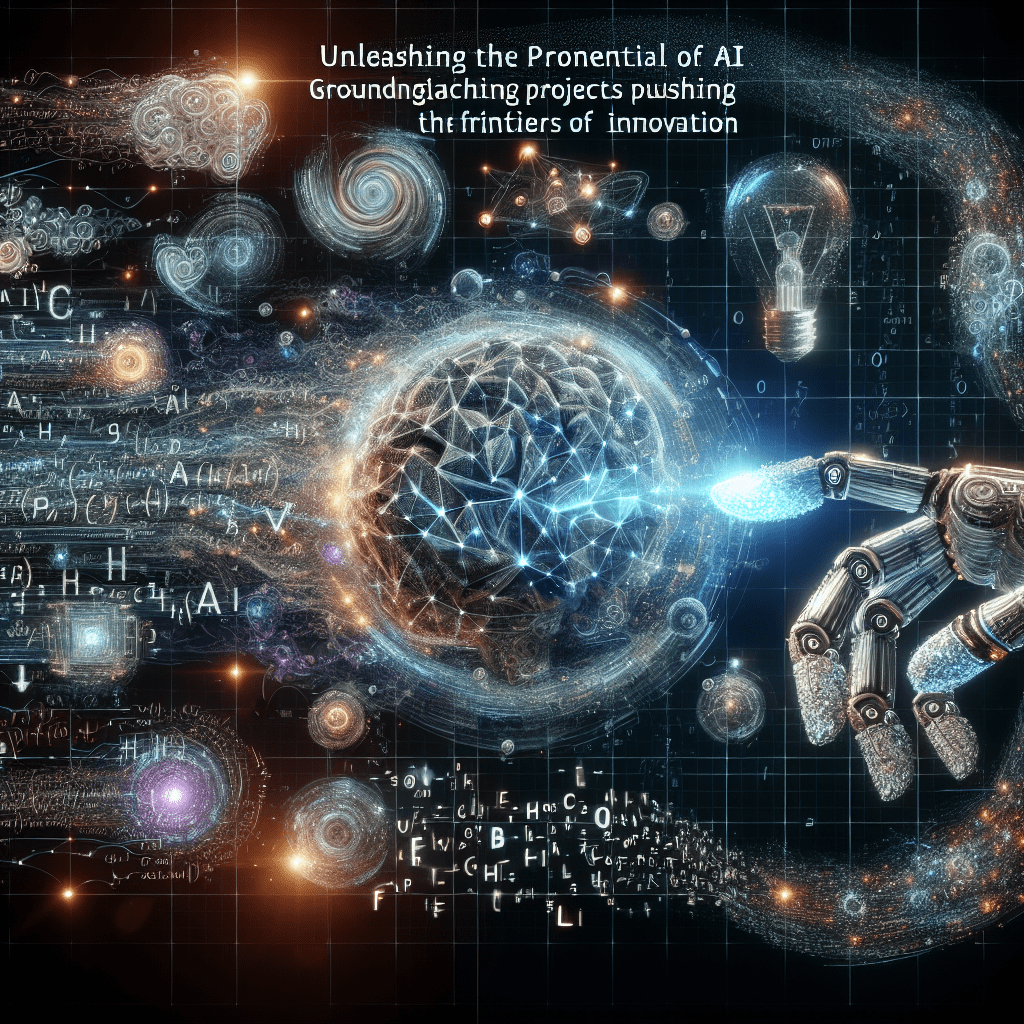Artificial Intelligence (AI) has become one of the most transformative technologies of our time. From self-driving cars to virtual assistants, AI is revolutionizing industries and reshaping the way we live and work. In this article, we will explore some of the most groundbreaking projects that are pushing the boundaries of innovation and unleashing the true potential of AI.
1. DeepMind’s AlphaZero:
DeepMind, a subsidiary of Alphabet Inc., has developed AlphaZero, a groundbreaking AI system that has achieved superhuman performance in various games, including chess, shogi, and Go. AlphaZero is a self-taught program that learns to master complex games through reinforcement learning and self-play. It has defeated world champions and top-ranked players in all three games, demonstrating the power of AI to excel in strategic decision-making and problem-solving.
2. OpenAI’s GPT-3:
OpenAI, a research organization dedicated to developing safe and beneficial AI, has created GPT-3, the third iteration of its Generative Pre-trained Transformer model. GPT-3 is one of the largest language models ever created, with 175 billion parameters that enable it to generate human-like text and perform a wide range of natural language processing tasks. GPT-3 has been praised for its ability to write essays, code, and even create music, showcasing the potential of AI to assist humans in creative endeavors.
3. Tesla’s Autopilot:
Tesla, the electric vehicle manufacturer led by Elon Musk, has been at the forefront of developing autonomous driving technology with its Autopilot system. Using AI and machine learning algorithms, Tesla’s Autopilot is able to navigate roads, detect obstacles, and make driving decisions without human intervention. While still in development, Autopilot has already demonstrated impressive capabilities in enhancing driver safety and convenience, paving the way for a future of self-driving cars.
4. IBM’s Watson:
IBM’s Watson is a cognitive computing system that has been used in various industries, including healthcare, finance, and customer service. Watson is capable of understanding natural language, processing unstructured data, and providing insights and recommendations to users. In healthcare, Watson has been used to assist doctors in diagnosing and treating patients, improving the accuracy and efficiency of medical decision-making. Watson’s versatility and adaptability make it a powerful tool for organizations seeking to harness the power of AI in their operations.
5. Google’s Duplex:
Google Duplex is an AI-powered virtual assistant that can make phone calls on behalf of users to schedule appointments, make reservations, and perform other tasks. Duplex uses natural language understanding and speech synthesis to engage in natural conversations with humans, making it indistinguishable from a human caller. Duplex’s ability to navigate complex conversations and complete tasks autonomously demonstrates the potential of AI to enhance productivity and streamline everyday interactions.
Conclusion:
These groundbreaking projects represent just a glimpse of the vast potential of AI to revolutionize the way we live and work. As technology continues to evolve and AI capabilities grow, we can expect to see even more innovative applications of AI in diverse fields. From healthcare and finance to transportation and entertainment, AI is poised to transform industries and empower individuals to achieve new levels of efficiency and creativity. By embracing AI and exploring its possibilities, we can unlock a future where the boundaries of innovation are constantly being pushed and new possibilities are being discovered.
FAQs:
Q: How is AI being used in healthcare?
A: AI is being used in healthcare for various applications, including medical imaging analysis, predictive analytics, personalized medicine, and drug discovery. AI technologies can help healthcare providers make more accurate diagnoses, improve treatment outcomes, and optimize patient care.
Q: Is AI ethical?
A: The ethical implications of AI are a topic of ongoing debate and scrutiny. While AI has the potential to bring about significant benefits, such as improved efficiency and accessibility of services, there are concerns about bias, privacy, and accountability in AI systems. It is important for developers and policymakers to address these ethical considerations to ensure that AI is used responsibly and ethically.
Q: What are some future applications of AI?
A: The potential applications of AI are vast and continue to expand. Some future applications of AI include autonomous vehicles, personalized education, smart cities, robotic automation, and virtual assistants. As AI technology advances, we can expect to see new innovations and opportunities emerging in diverse sectors.
Quotes:
“The development of full artificial intelligence could spell the end of the human race.” – Stephen Hawking
#Unleashing #Potential #Groundbreaking #Projects #Pushing #Boundaries #Innovation


